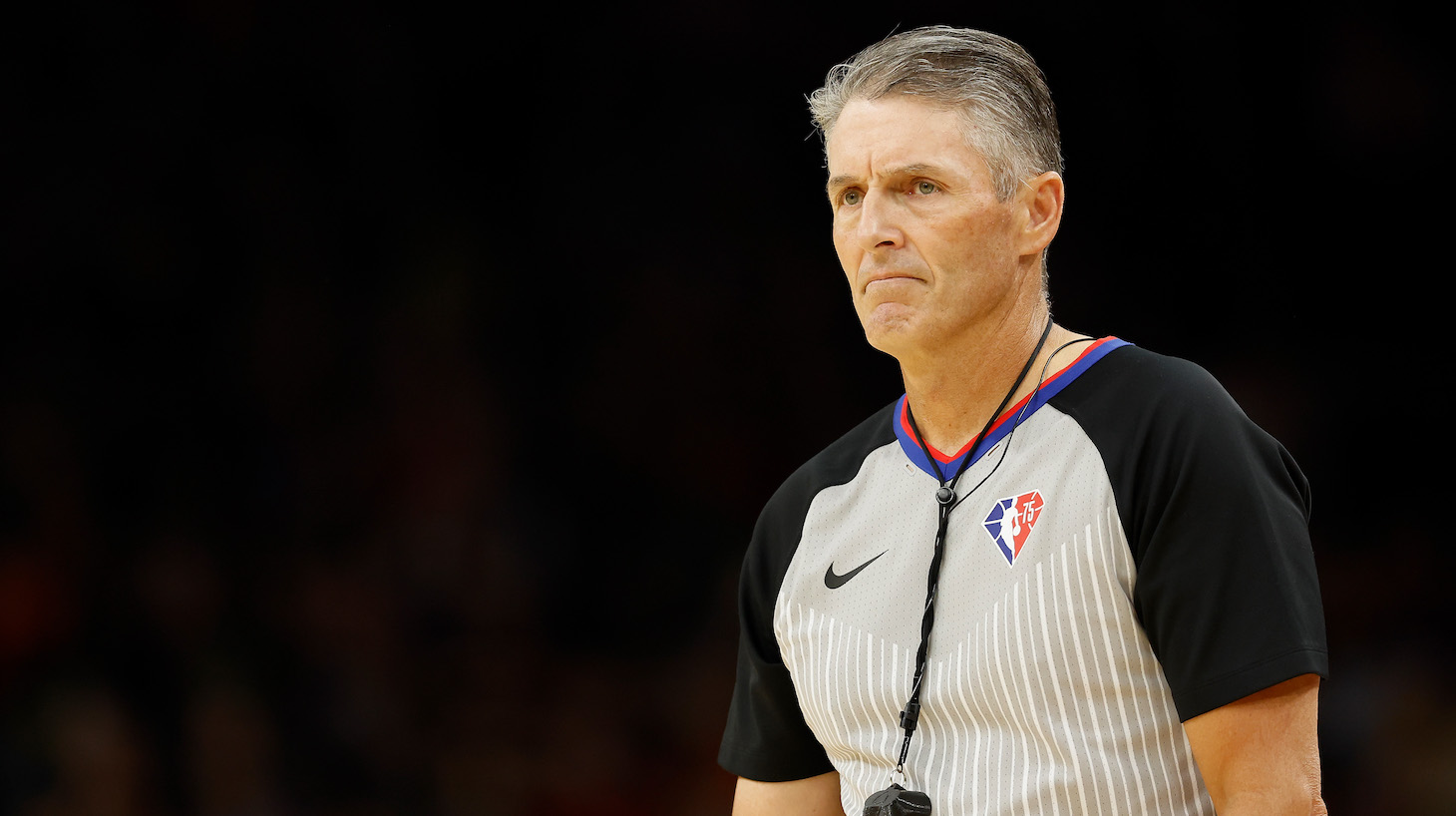At 9 a.m. the National Basketball Association announced its three officials for Game 3 of the Finals, and as practiced observers of the art would know, the crew started with Scott Foster. Because Foster is the most experienced of the 12 remaining candidates (six as-yet unused officials, plus six alternates). Also because Foster is considered by outsiders to be the league's best choice for what has become a significant annoyance: finding a crew that won't become an irksome talking point on Thursday morning.
In other words, fuel for nerds talking to nerds about nerd stuff in the nerd brigade, of which your humble typist is a charter member since Earl Strom first had to punch his way through a wall of Rochester Royals fans just to get to his locker. Ref-watching was fun until Mark Cuban started complaining about it enough to get regularly fined about it. Now it's three insurance salesmen Zooming quarterly reports to the home office every 15 minutes.
Which is where Foster comes in. He is the new catch-all magnet for fans who don't want to be nerdy enough to worry about the officials but still want to seem like they're down with the culture. Foster has done more Finals games than any of his contemporaries largely because he's done more games than any of his contemporaries, but also because he looks and acts the part of the old-school guy that everyone craves even though they've mostly fallen out of fashion. Every team's fan base hates Foster and winces with Pavlovian speed when his name comes up just because, well, because they've successfully paired his name with his face.
Thus, his inclusion in the Game 3 crew isn't considered just another assignment but as some kind of statement of a problem that the league thinks needs intervention, whether it does or not. Most practiced observers (there are about six of them, frankly) think Games 1 and 2 were actually officiated well by the modern standards and practices, except for the … well, you know.
Draymond Green had been hit with a quick early technical foul in Game 2 by Josh Tiven, and flirted clumsily with a second when he used Boston's Jaylen Brown as an ottoman, which by every agreed upon standard would have netted a second technical and a potential game-changing ejection…
…if it weren't the Finals. And if it weren't him.
What was clear from the second incident was that crew chief Zach Zarba, the officials' Professor X to Foster's Wolverine, was working his frontal lobe to the calcified nucleus not to give Green the second technical that he would surely have gotten in the regular season, and he found a way to avoid doing so, even if it meant applying a different standard than the standard standard, because Green is a made guy that way, and the only thing the first technical gave him was a hall pass the rest of the night, which he very well understood.
This seemed a bit confusing to the unpracticed nerd-in-training until ABC went to its officials/rules analyst, the former official and Finnish injury lawyer impersonator Steve Javie, who led with honesty and told the world what people inside the league have known for essentially six decades. Namely, that a good referee is supposed to know who is close to fouling out, who has a technical foul and is flirting with a second, and most importantly, how not to connect those dots.
This came as an annoyance to those casual fans who want a foul to always be a foul regardless of context, and to tinfoil-hat aficionados who think the league's officiating laundry was exposed when Tim Donaghy had his moments of doubt, pain, and point-shaving two decades ago and have thought the game's been on the make forever. That bridged the conversation gap for two days that Klay Thompson's errant shooting and Al Horford's 57th birthday could not properly sustain.
The NBA, more than any other sport, deals with impolitely loud whispers that their games are manipulated and/or out-and-out fixed, either because the league wants more inventory for its broadcast partners, more money for itself, or to just gin up the drama before the real season—summer league—begins 20 minutes after the last game.
But to hear Javie blithely say that of course Green wouldn't be T'd up again because as a habitual offender he actually gets more lead than the good children in class, and for both coaches to essentially agree that neither expected Green to get the second T and the doorway to the loading dock? Well, that created fevered levels of discussion that the first two dysrhythmic games could not match on their own merits.
Whether it was biz as usual, Zarba blinking from the cold light of fact, the NBA being too willing to let bygones be highlights, or everyone knowing the score even as it was being recorded, Draymond's place in Game 2 was safe as houses, and he knew it. If a technical foul isn't the last warning, it's no warning at all, and Draymond Green understands that truth most of all. Maybe the non-ejection wasn't the problem, but rather Tiven's tooth-free technical seven minutes into the game. Maybe raising the specter of future problems that were never going to be addressed was what made this a hot mess from the start.
In other words, you got two off-days between games, so you get two off-days of excruciating hypothetical chat from people who should have had their tongues repo'd for the peace and quiet. The folks who care too much about too little are now trying to figure out what message the league is trying to send with David Guthrie and Courtney Kirkland as Foster's partners when the message is probably nothing more than, "Well, we need three of 'em, and someone's gotta do it."
The NBA does have an officiating problem; several, in fact. The way the officials run to a spot and then stay there hoping fouls will magically come to them; the way they hover around the replay monitor like bears around a station wagon with food in the back seat; the way they communicate with players the way landlords talk to their deadbeat tenants' kids; and especially the way they struggle to take a level of game command that was considered a minimal standard 20 years ago when Hugh Evans, Richie Powers, Jake O'Donnell and Joey Crawford roamed the land. Those guys were judgmental, stern, attitudinal, and well and truly feared as well as respected, or at least as respected as officials ever get, while the present group is slighter, weaker, younger, less worldly, more imperious with players and largely unsupported by the league that pays them. And it shows, night in and night out.
And yet the league has decided that engaging in discussion about the elephant in the pantry is beneath it, so the outside world, fallible to the point of criminally stupid though it is, gets to create whatever narrative it wants, and what it wants is to assume that incompetence is now in the rear-view mirror and intentional reality-bending is dead ahead.
It doesn't matter whether the public is right or wrong. The public resides in a world in which officials are cowardly at best, stubbornly putrid as the norm and out-and-out result-shifters at worst because nobody has ever bothered to explain to them why it isn't necessarily so. The audience just learned to its consternation that technical fouls don't actually matter because they aren't last warnings but a quiet tut from a kindly yet disinterested aunt who doesn't want to tear herself away from whomever Judge Judy is shrieking at. Draymond Green knows that for sure.
So 9 a.m. came, and Foster's name was first among the names listed for the three-man crew for Game 3, with allegedly knowing conspiratorial nods from both Celtics and Warriors fans, mostly because there are only four officials that anyone other than the nerd brigade actually knows. Zach Zarba is the second because of recency bias. Tony Brothers is the third, because his eyebrows were designed by a Polish quilting bee. And Ed Malloy because of this, even though Malloy is only an alternate in this series.
The league will hope nothing untoward happens in Game 3, and that the two teams still trying to find a consistent form will not bring Foster, Guthrie, and Kirkland to the scorer's table too often for hostage-video quality explanations of whether a foul is a Flagrant Zero, a Flagrant 0.5, or a Flagrant 0.8. Even if tonight's game is piefight fun as the first two games have been, that won't be how they are remembered if you see Foster explaining something more than once, or at any time in the fourth quarter.
So, Scott Foster. This is his time. You'll hate it. Even if you secretly like it. And the NBA will aggressively not care because it knows better than to try to explain time-honored inconsistencies. And now that Steve Javie has explained that fact to a slack-jawed and confused nation, you can’t say the league hasn’t asked for this. In other words, Foster better save everyone's ass tonight, and good luck with that.






